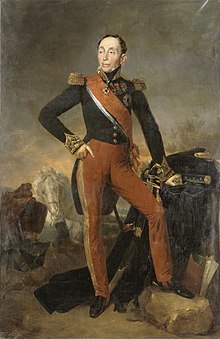Emmanuel, marquis de Grouchy
| Emmanuel de Grouchy | |
|---|---|

Emmanuel de Grouchy
|
|
| Born |
23 October 1766 Paris, France |
| Died |
29 May 1847 (aged 80) Saint-Étienne, France |
| Allegiance |
|
| Years of service | 1779 - 1815 |
| Rank | Marshal of France |
Emmanuel de Grouchy, 2ème Marquis de Grouchy ([e.ma.nɥɛl də ɡʁu.ʃi]; 23 October 1766 – 29 May 1847) was a French general and marshal.
Grouchy was born in Paris, the son of François-Jacques de Grouchy, 1st Marquis de Grouchy (born 1715) and intellectual wife Gilberte Fréteau de Pény (died 1793). His sister was Sophie de Condorcet, a noted feminist. He entered the French artillery in 1779: in 1782 he was transferred to the cavalry, and subsequently, in 1786, to the Gardes du Corps. In spite of his aristocratic birth and his connections with the court (as his father, having served as a page, was rumoured to be the illegitimate son of king Louis XV), he was a convinced supporter of the principles of the Revolution, and had in consequence to leave the Guards.
About the time of the outbreak of war in 1792 Grouchy became colonel of the Régiment de Condé-Dragons, and soon afterwards, as a maréchal de camp, he was sent to serve on the south-eastern frontier. In 1793 he distinguished himself in La Vendée, and was promoted Général de division. Grouchy was shortly afterwards deprived of his rank as being of noble birth, but in 1795 he was again placed on the active list. He served on the staff of the Army of Ireland (1796–1797), and took a conspicuous part in the Irish expedition. In 1798 he administered the civil and military government of Piedmont at the time of the abdication of the king of Sardinia, and in 1799 he distinguished himself greatly as a divisional commander in the campaign against the Austrians and Russians. In covering the retreat of the French after the defeat of Novi, Grouchy received fourteen wounds and was taken prisoner.
On his release Grouchy returned to France. In spite of his having protested against the coup d'état of the 18 Brumaire he was at once re-employed by the First Consul, and distinguished himself again at Hohenlinden. It was not long before he accepted the new régime in France, and from 1801 onwards he was employed by Napoleon in military and political positions of importance. He served in Austria in 1805, in Prussia in 1806, Poland in 1807, where he distinguished himself at Eylau and Friedland, Spain in 1808, and commanded the cavalry of the Army of Italy in 1809 in the Viceroy Eugène's advance to Vienna.
...
Wikipedia
